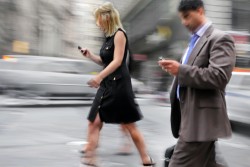Transparency is extremely important to us, so we are letting you know that we may receive a commission on some of links you click on from this page. See our disclaimer.
“The cognitive challenges of walking while texting are well known, both to scientists and to those of us who have ambled into a light pole or a fellow pedestrian or have been on the receiving end of someone else’s distracted movements. Strolling while talking on the phone — or, more particular, texting — ties up the brain’s relatively limited working attentional resources, most researchers would agree, much as those activities do when you are driving,” the New York Times reports.
 “But walking is not driving. In some ways, it’s more demanding. You sit while you drive. Walking requires a multitude of orchestrated actions and reactions. But whether and how using a phone affects the physical process of walking and whether those impacts might have health costs have been little explored.”
“But walking is not driving. In some ways, it’s more demanding. You sit while you drive. Walking requires a multitude of orchestrated actions and reactions. But whether and how using a phone affects the physical process of walking and whether those impacts might have health costs have been little explored.”
“So researchers at the University of Queensland in Brisbane, Australia, rounded up 26 healthy adults for a study, published last month in PLOS One, and sent them strolling repeatedly along a 28-foot stretch of hallway while cameras captured their steps. In one setup, the volunteers walked without a phone; in another, they read a long text on a phone’s screen; and in a third, they texted ‘The quick brown fox jumps over the lazy dog.' The volunteers were told to hold the phone and type as they usually would. They were also asked to try to walk as normally as possible.”
“As it turned out, texting significantly distorted their gait and walking form, whether they intended to contort themselves or not. Most noticeable, the volunteers began to walk with a more upright and rigid body position. Their heads froze into cocked and largely unchanging positions, eyes on the screen, chins bent toward their chests. Their necks and lower back joints had significantly less range of motion.”
Today: “Need some incentive to dial back your texting habit? Typing on tiny devices can make you feel less confident, finds new research from Harvard Business School.”


0 Comments